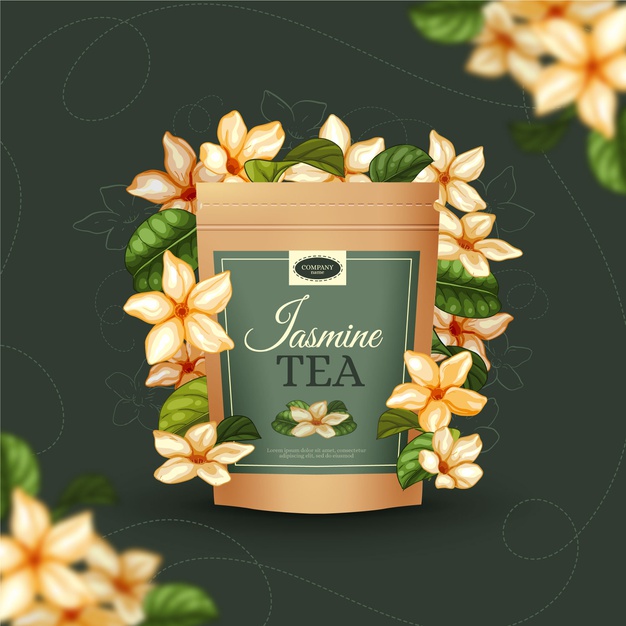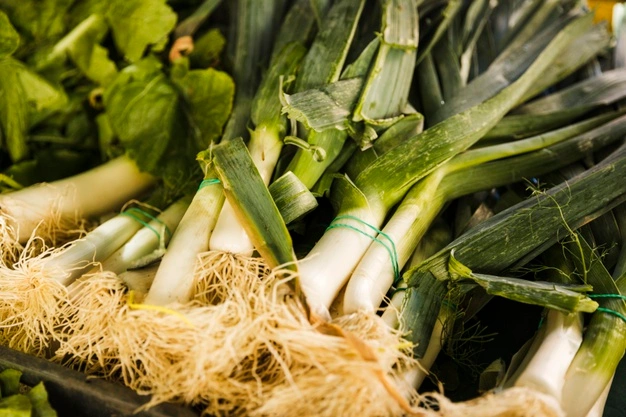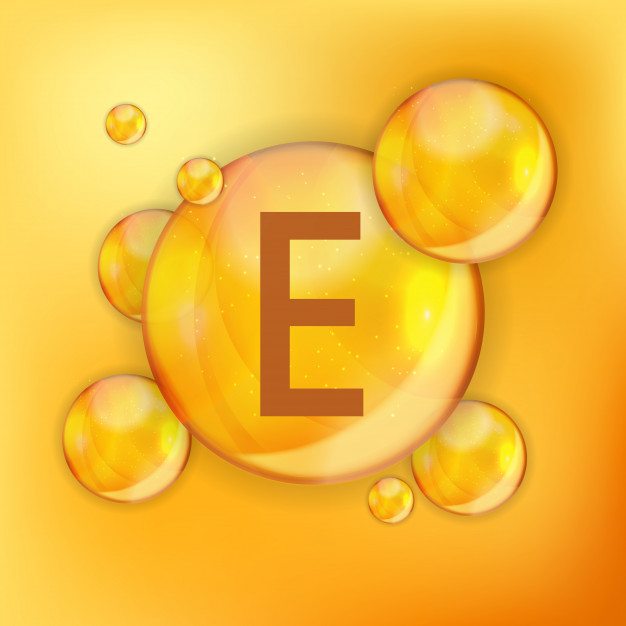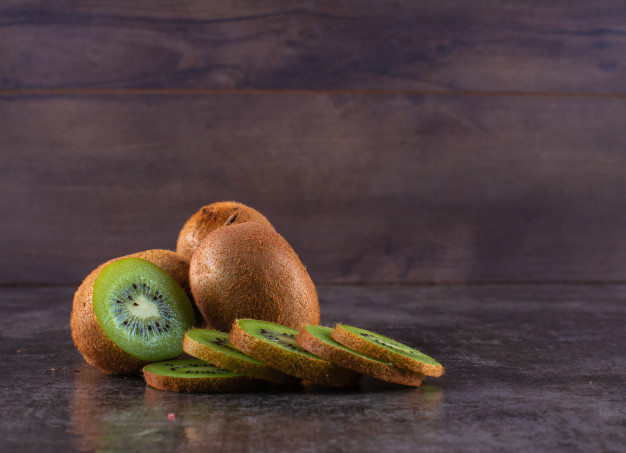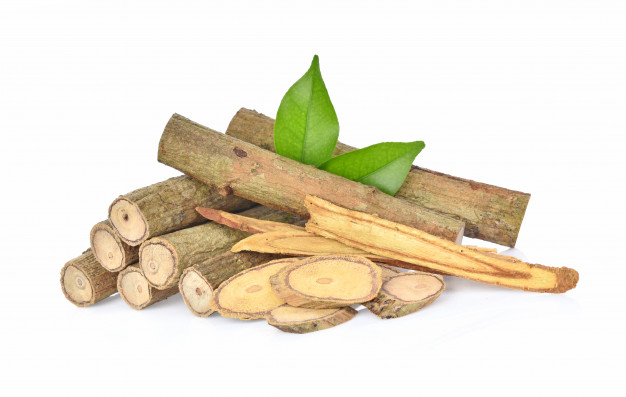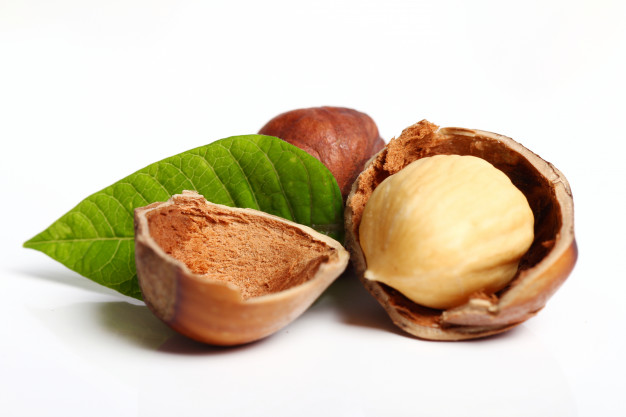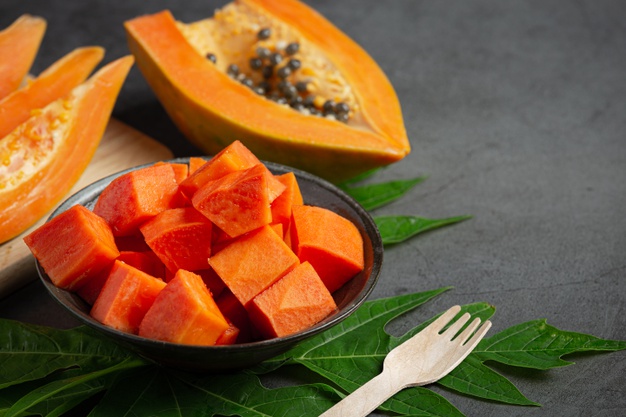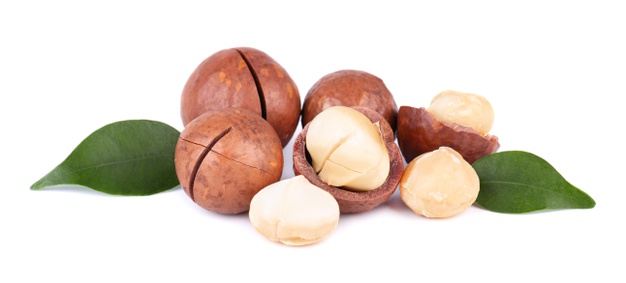Jasmine tea is a very popular scented tea generally prepared by infusing true tea leaves like green tea leaves or black tea leaves with jasmine flowers. With a pleasant flavor jasmine tea also offers numerous health benefits. It has been extensively used in aromatherapy as well.
Biological activity
Antioxidant activity
- Polyphenol components of jasmine tea especially catechin is responsible for exerting strong antioxidant activity, which play vital role in preventing oxidative damages of body thus reduces the susceptibility of developing chronic diseases
- It helps to destroy free radicals and reduces oxidative stress
- It also prevents lipid peroxidation
- Its consumption is very effective for decreasing cellular damage too as it helps to protect every cells of the body from free radical induced oxidative damages thus promotes cellular functionality and also promotes wellbeing
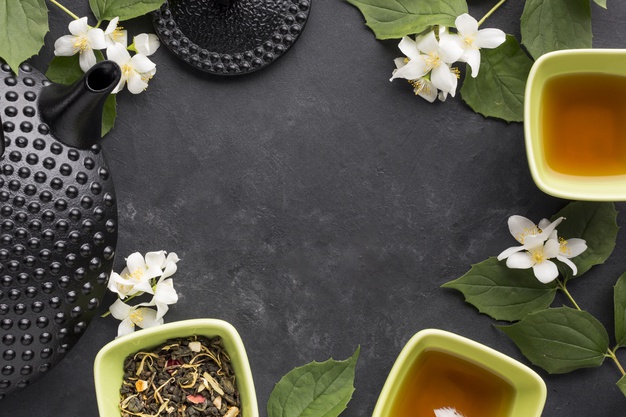
Anti-carcinogenic activity
- It has potent anti-cancer property that helps to reduce the prevalence of carcinoma
- It helps to suppress the growth of cancerous cells and also inhibits spreading of cancerous cells
- EGCG component of jasmine tea plays significant role in reducing tumor cell size
- It has seen that consumption of jasmine tea (using green tea as base) significantly decreases the recurrence of colon cancer cells among people with colon cancer
- It is very effective for decreasing the prevalence of breast cancer, prostate cancer, and bladder cancer

Antimicrobial activity
- It has antimicrobial activity the helps to destroy disease causing microbes thus protects the body from their harmful consequences
- On the other hand it promotes the growth of beneficial microbes within body, which help with digestion
Health benefits
Role on oral health
- Consumption of jasmine tea is closely associated with improving oral health
- Its catechin component is responsible for preventing tooth decay
- It also helps to prevent cavities
- It has seen that jasmine tea plays imperative role in decreasing the level of Streptococcus mutans within oral cavity thus helps to stop them from acid production and prevents eroding of tooth enamel
- It helps to prevent dental plaque formation as well
- It is also linked with combating bad mouth odour by destroying odor causing bacteria
Role on boosting energy
- Jasmine tea contains caffeine that helps to boost up the energy level of the body
- It also helps to improve alertness
Role on immunity
- Its antioxidant, anti-inflammatory properties and micronutrients components are responsible for boosting up the overall immunity of body thus it consumption is thought to be very effective for keeping the immune health at optimum level
- It also helps to improve immunological responses as well
- It is very effective for preventing normal cold and flu
- It also helps to reduce the risk of developing communicable as well as non-communicable diseases as healthy immune system makes the body able to fight against severe illnesses
- The aroma of jasmine tea is also very useful for making an individual feel better when he or she is under weather

Role on nervous system
- Jasmine tea helps to boost up the overall functionality of brain
- It contains caffeine, which is accountable for stimulating nervous system by blocking inhibitory neurotransmitter. Inhibitory neurotransmitter is associated with delivering signals between brain and body
- Caffeine present in jasmine tea is also responsible for enhancing brain activity by regulating the release of mood enhancing neurotransmitter like serotonin and dopamine
- L-theanine component of jasmine tea is also responsible for enhancing the activity of brain
- It helps to make an individual more energized
- It also improves alertness
- It has seen that consumption of jasmine tea is very effective for enhancing short term memory
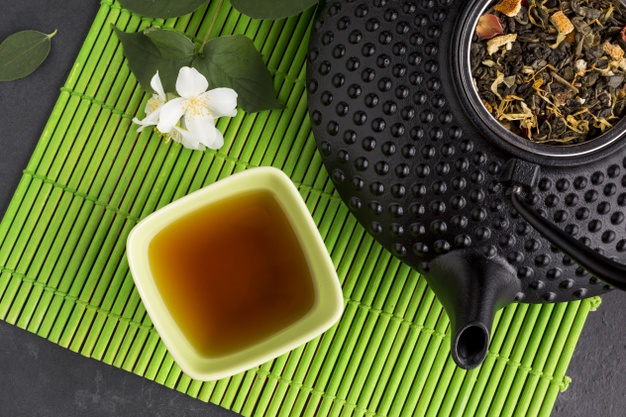
Role on skin
- Jasmine tea offers several skin benefits
-
 Its antibacterial activity is responsible for decreasing the prevalence of skin infections
Its antibacterial activity is responsible for decreasing the prevalence of skin infections - Its antioxidant activity is also related with preventing ageing as it helps to protect the skin from oxidative damages
- It is very effective for preventing skin wounds as well as scars
- Polyphenol components of jasmine tea help to minimize fine lines and also prevent pigmentation
Role on circulation
- It plays significant role in promoting blood circulation
- It has seen that consumption of jasmine tea is associated with preventing various health complications, which interfere with proper blood circulation like thrombosis, blood clots, brain damage and blocked arteries
Role on relieving stress
- It has potent aforementioned therapeutic properties, which make it an effective anti-depressant substance
- Olfactory functions of jasmine tea are responsible for providing relaxation to the body
- It has seen that the aroma of jasmine tea is directly linked with initiating a parasympathetic response in body that is responsible for stimulating the release of various chemicals that help to provide calmness to the body thus helps in reducing stress level
- It also helps to elevate mood
Disease preventive role
Inflammatory bowel disease
- It is a gastrointestinal complication characterized by bloating as well as pain in colon
- It has seen that consumption of jasmine tea is very effective for preventing this complication

Obesity
- Its consumption is directly linked with increasing the metabolic rate of the body, which helps to burn fat relatively faster and facilitates weight reduction
- Catechin component of jasmine tea has potent fat burning property too that also helps in preventing obesity
Prevention of pains or aches
- It exhibits anti-inflammatory activity thus its consumption is closely associated with relieving any kind of pains or aches
- It has seen that epigallocatechin gallate component of jasmine tea helps to decrease the concentration of inflammatory markers in body, which plays significant role in preventing inflammation
- It also helps to prevent joint swelling
- Its consumption is very effective for improving the symptoms of rheumatoid arthritis
Parkinson’s disease and Alzheimer’s disease
- Jasmine tea is loaded with polyphenols, which play imperative role in lessening the prevalence of Alzheimer’s disease and Parkinson’s disease
- It helps to protect the neurons from free radical induced oxidative damages thus delays the progression of these two neurological disorders
- EGCG component of jasmine tea also plays vital role in inhibiting misfolding and clumping of proteins in brain, which is also responsible for reducing the risk of developing Alzheimer’s disease and Parkinson’s disease as misfolded proteins are responsible for causing inflammation and damages of nerves

General consideration of using jasmine tea
- Jasmine tea is widely available in the form of loose leaves, tea bags and pearls but it is better to purchase pearls or loose leaves for preparing jasmine tea as tea bags may contain broken leaves or other undesired portion of tea plant that can interfere with the taste of the tea
- It can be easily prepared by taking the loose leaves or pearls in a pot and adding hot water on it
- It is better to avoid the using of boiling water for preparing jasmine tea as it may ruin the flavor of the tea
Risk factors
- Jasmine tea is very much healthy and it has very less or no side effects but as it contains caffeine thus it’s over consumption is not wise as it may develop some health hazards like digestive issues, irritability, jitters, anxiety, restlessness etc
- It also contains catechin, which may interfere with iron absorption in large dose thus can increase the risk of developing iron deficiency anemia
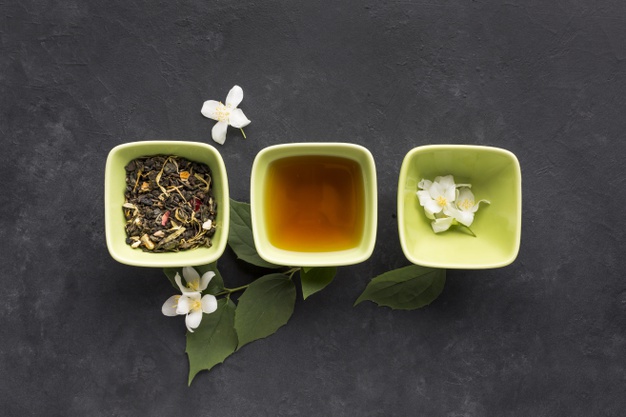
Source:
Arifan, F., Winarni, S., Handoyo, G., Nurdiana, A. and Risdiyanti, S., 2018, May. An analysis of antioxidants, organoleptics and hedonics with variations of boiling time in Jasmine tea and Jasmine root tea a study on Kaliprau, Pemalang. In Journal of Physics: Conference Series (Vol. 1025, No. 1, p. 012066). IOP Publishing.
Chen, M., Zhu, Y., Liu, B., Chen, Z., Zheng, J., Guan, M., Shi, H., Wang, Y. and Yang, W., 2017. Changes in the volatiles, chemical components, and antioxidant activities of Chinese jasmine tea during the scenting processes. International Journal of Food Properties, 20(3), pp.681-693.
Gao, Y., Hu, N., Han, X., Giffen, C., Ding, T., Goldstein, A.M. and Taylor, P.R., 2009. Jasmine tea consumption and upper gastrointestinal cancer in China. Cancer Causes & Control, 20(10), pp.1997-2007.
Guo, Y., Lai, L., Diao, X., Ouyang, J. and Liao, Z., 2017. Research status of above-special-grade Jasmine tea and the influencing factors of its quality. Journal of Food Safety and Quality, 8(1), pp.156-162.
Jun, Z., Shuying, G., Desong, T., Yingbin, Z. and Meili, C., 2015. Quality evaluation and price discrimination of jasmine-scented tea. Journal of Zhejiang University (Agriculture and Life Sciences), 41(5), pp.577-585.
Kuroda, K., Inoue, N., Ito, Y., Kubota, K., Sugimoto, A., Kakuda, T. and Fushiki, T., 2005. Sedative effects of the jasmine tea odor and (R)-(−)-linalool, one of its major odor components, on autonomic nerve activity and mood states. European journal of applied physiology, 95(2), pp.107-114.
Wu, Q. and Yang, J., 2021. Comparative advantage analysis of production of jasmine tea in China. In Journal of Physics: Conference Series (Vol. 1774, No. 1, p. 012044). IOP Publishing.
